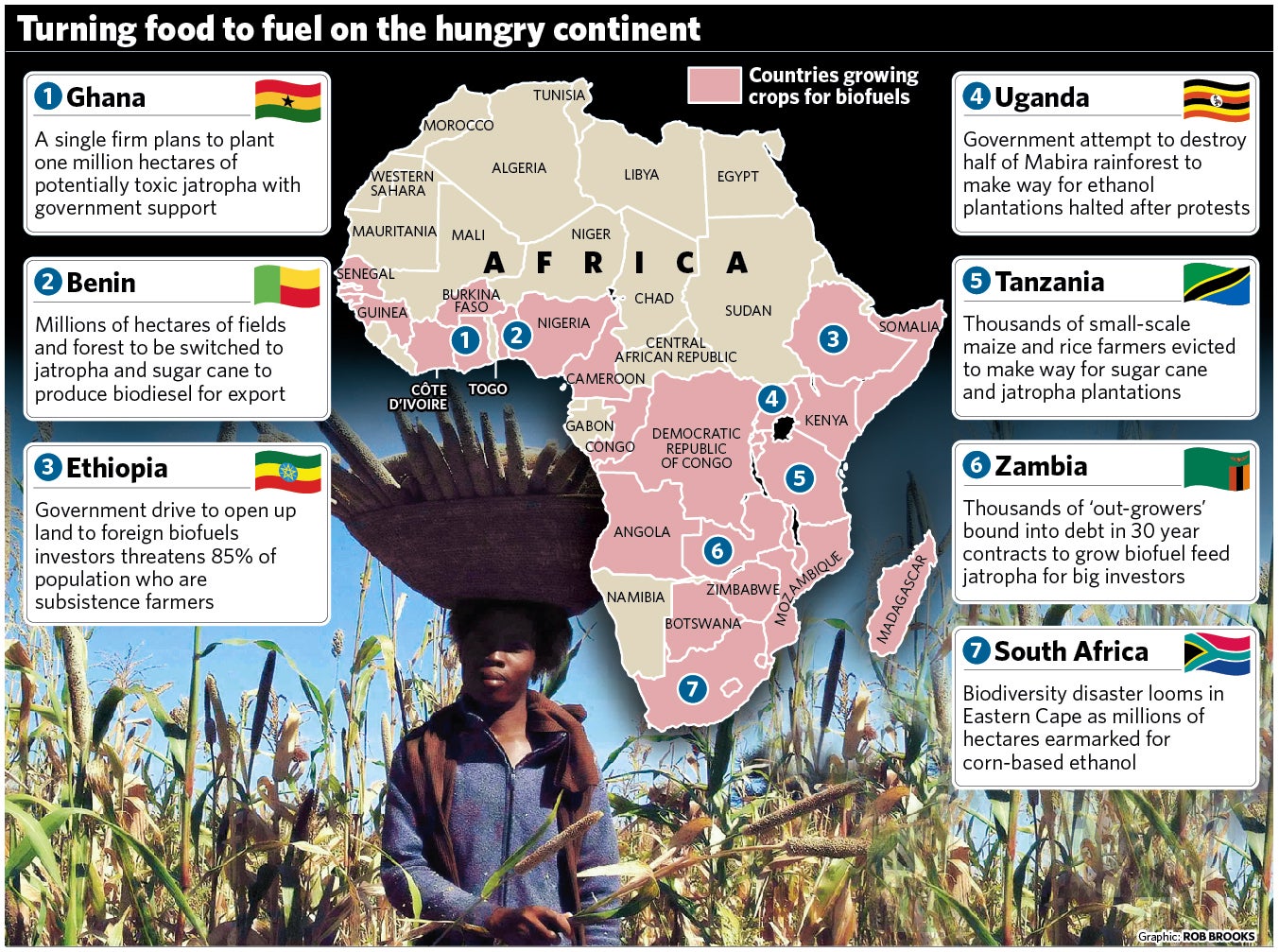Africans unite in calling for immediate moratorium on switch from food to fuel

Scientists and NGOs across Africa are calling for a moratorium on new biofuels projects as millions of acres of prime agricultural land in sub-Saharan Africa are switched from food to fuel.
African governments, encouraged by counterparts in the industrialised world, have bought eagerly into the "green revolution" with promises of exports, energy security and job creation. The reality is the forced removal of small farmers, rising food costs and scant benefits for local populations.
Food riots broke out this week in Mozambique as government attempts to control bread and fuel costs collapsed under the strain of soaring prices for oil and for food staples, driven in part by demand for biofuels.
The prospect of a "Green Opec" of countries switching to biofuel – or agrofuel – plantations on the most food-insecure continent has prompted an appeal for a "time out" from an alliance of African civil society groups. "We need to protect food security, forests, water, land rights, farmers and indigenous peoples from the aggressive march of agrofuel developments," reads the call for a moratorium.
"Africa is a wide open continent and the energy industry wants to take advantage," said the renowned Nigerian environmentalist Nnimmo Bassey. "This is a flashback to colonial plantations." Mr Bassey is part of the African Biodiversity Network, an umbrella group who met to discuss the crisis this week in South Africa.
Rich nations concerned with future energy security and climate change have begun to seek alternatives to fossil fuels that won't carry the political costs of calling for consumer restraint. In the US this has meant an epic extension of subsidies for big agricultural interests to switch corn production to ethanol. The European Union has committed itself to switching 10 per cent of all transport fuel to biofuels by 2020 with the shortfall in what can be grown inside the 27-nation bloc to be made up with imports from the developing world.
From the savannahs of west Africa to the rainforests of Congo, the plains of Tanzania and the wilderness of Ethiopia, governments are handing over huge tracts of fertile land to private companies aiming to convert biomass grown on large plantations into liquid fuels for export markets. African leaders like Senegal's Abdoulaye Wade are predicting a "green revolution" and looking eagerly to lucrative exports.
Just as the bonanza is getting into full swing, the scientific argument that biofuels mitigate climate change is collapsing. Last week, the journal Science published a major study concluding that biofuels contributed to climate change as the environmental cost of land conversions generated more carbon emissions than it saved.
The biofuel surge comes despite clear consensus that Africa will bear the brunt of climate change and be the continent hardest hit in the future by changes in our weather systems.
In addition to this, the production of maize, southern Africa's staple food, could drop by as much as one third in the next 20 years, according to a new Stanford University study.
The UN's two leading food agencies both issued warnings this week that demand for biofuels is in danger of leaving the poor hungry. Josette Sheeran, of the World Food Programme, said: "We're seeing many people being priced out of the food markets for the first time. For the world's most vulnerable, it's extremely urgent," she said. The Food and Agriculture Organisation said on Wednesday that some 100 million tons of cereals are being diverted to the production of biofuels each year.
Even organisations which have not joined the calls for a moratorium, such as the International Institute for Environment and Development in London, have expressed serious reservations. "There's a lot of concern about land grabs and displacement," said a senior analyst, Bill Vorley. "Big plantations are back with the help of the 'green revolution' steamroller. It feels like we are back to the bad old days again."
Join our commenting forum
Join thought-provoking conversations, follow other Independent readers and see their replies
Comments